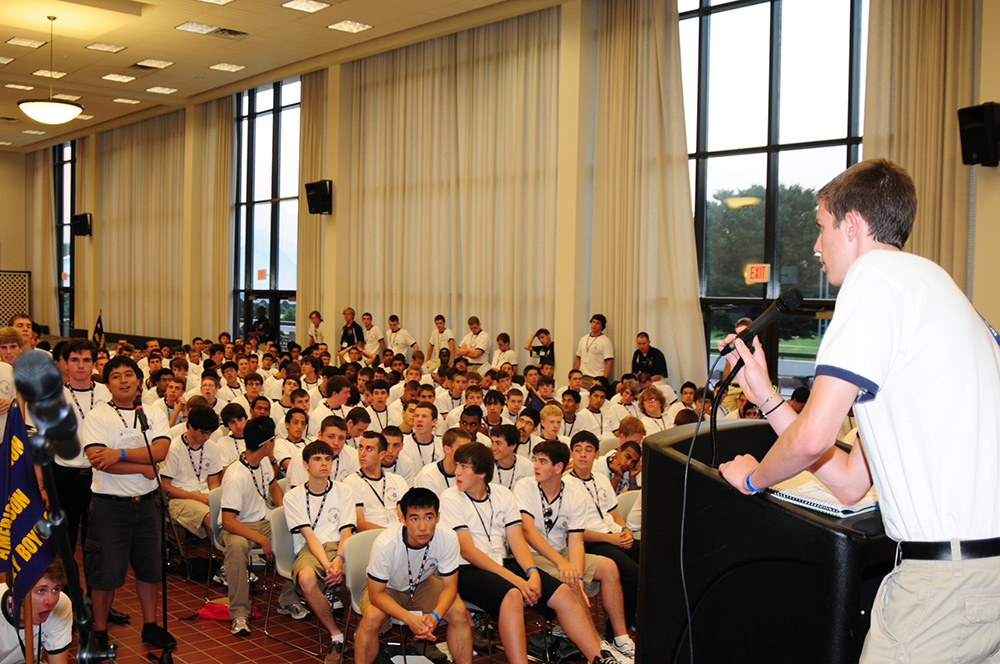News Archive

"Achievement is not always success, while reputed failure often is. It is honest endeavor, persistent effort to do the best possible under any and all circumstances." -Orison Swett Marden
Earlier this year, Grantland's Steve Hyden wrote a seven-part series called, "The Winners' History of Rock 'N' Roll." Hyden picked seven different successful bands from the genre's fifty-year history and examined their careers and legacies. The last band profiled was The Black Keys, a garage/blues-rock duo from Akron, OH. Over the last decade, The Black Keys have released a number of well-made albums, culminating in their Grammy-winning, Platinum-selling El Camino album two years ago.
The band has a feel-good story: two childhood friends who started jamming in basements, got signed to a record deal, slowly developed their style, toured like maniacs, and made it to the big time. It's a narrative as blue-collar as their home city.
What makes The Black Keys' story interesting-and a little squeamish-is their outspoken dislike of modern indie rock. It wasn't just a band feud. The Black Keys took aim at indie rock itself, specifically its artistic-integrity-over-commercial-success aesthetic. The Black Keys wanted to be successful and made efforts to do so. Their music became more commercial and less esoteric. They licensed their songs as much as they could, even poking fun at themselves on The Colbert Report by competing in a "sell-out-off" with Vampire Weekend.
To The Black Keys, indie rock was elitist music made by the privileged. Said guitarist Dan Auerbach, "There's this weird thing that happened with being a successful band, and it has to do with rich, private-college kids who rule the indie rock world - kids who never really have to worry about anything because they always have some sort of backup plan that they can safely fall into. We come from middle-class families. We're both college dropouts. Driving around the country, paying for everything ourselves - this is the backup plan. The only plan, really."
Auerbach may be combining a persecution complex with class-baiting but he's also recognized that each group measures success differently. To The Black Keys, success is being as popular and affluent of a band as you can be. To many indie rockers, success is creative freedom in making music that matters. By each other's standards, each group is a failure; by their own, they are successes.
Defining a standard for success in music is difficult and subjective. It is equally difficult at American Legion Jersey Boys State. There are a hundred different things occurring this week, so what actually defines success or failure? Is a week successful because you got through the schedule perfectly on time? Is it successful because the statesmen had big Aha! moments and understood the program's core values? Is it successful because the delegates enjoyed being with each other?
More hauntingly, what does a failed week look like?
****
Hidden in the nuances of this year's Prologue is a vicious secret. It's an obvious one, hidden in plain sight, and it is this: you will fail.
Because you will fail. Future tense, guaranteed certainty. To err is human. Even the best in their fields fall short quite often. The question is when and how you will fail, not if.
On second thought, that's not quite right. Since we know that we will fail, the question really is, "what do I do when I fail?"
Some will tell you to keep failing. "Fail fast and fail hard," writes the Drucker Institute. After all, Abraham Lincoln consistently failed at everything before becoming President. Thomas Edison made 3,000 lightbulb designs and prototypes before finding one that worked. The field of venture capitalism is built on this very idea. Only a small handful of startup companies succeed but they will be hidden among the failures. In all of these situations, you are supposed to keep on moving regardless of failure.
This is good advice. Lincoln's record of failures may be overstated but a large chunk of it is true. Edison famously claimed that he hadn't failed but had "just found 10,000 ways not to do it." Economist Tim Harford examined many complex systems and found that the successful ones were built through trial and error. As Neil Gaiman put it, failure indicates that, "you are making new things, trying new things, learning, living, pushing yourself, changing yourself, changing your world. You're doing things you've never done before, and more importantly, you're Doing Something."
To be failing means that you're making an effort. If you learn from your failures and keep trying, you will succeed at some point.
To answer the question, what do I do when I fail? I take a different angle and keep trying.
This helps me. But what about the people I've failed? Any failure has fallout. A failed startup puts people out of work. Edison's great attempt to get magnetite out of rock was financially unsuccessful and had several accidents which killed workers. Edison was able to reuse some of his ideas later but there was a heavy price for his decisions. What will the price be for the statesmen that I, their counselor, fail? Am I harming their future and the future of this country?
Fail hard doesn't work so well at Boys State. With only a week, there's little time to recover from a mistake. I've made bad decisions that left me feeling like I ruined the ALJBS experience of a delegate and wondering if I was a good counselor at all. What I learned through experience is what the best counselors know and what we established earlier: keep going. Learn from your mistake and don't build a home in it. Even if you make a big mistake, realize that the program is bigger than you and your mistake, and don't stop trying to help your statesmen.
In Winston Churchill's words, "success is not final, failure is not fatal; it is the courage to continue that counts."
****
If you ask ALJBS staff members why they come back, you'll probably get the same response from each one. The words might change a bit but most will say that we want to give back to a program that gave to us. Our experience as delegates changed us and we want to give successive generations an opportunity to feel the same emotions we felt. There's a reason we call this, "A week that shapes the future" and not, "the best politics camp in New Jersey." Politics is a major part of what we do here but most of us don't come back for the politics.
What makes Boys State special is the way everything comes together to broaden delegates' horizons. The combination of bounded, newfound autonomy and a range of activities forces statesmen out of school's familiar rhythms. They learn by experience instead of by a book.
Though they may not realize it, they're starting to become adults before our eyes. We recognize it, though, and our job is to guide them toward their new course while reinforcing important lessons about citizenship and leadership. Our guidance lessens throughout the week, and by Friday, they are ready to be their own men.
Our time of education here is done. The statesmen have at least one more year of education ahead of them, probably five. Then, the big important life questions will come. What do you want to become? What will you do with your time (and will you volunteer some of it to come back to Boys State and teach others)? Who do you want to become?
What will you do when you fail? What will you do when you succeed?
Because, as Neil Gaiman explained so clearly, there are significant challenges when you succeed as well as when you fail. Success exacerbates the individual's sense of self-worth. Contributing isn't enough anymore. I must be recognized for my contribution because I am important.
Legendary basketball coach and executive Pat Riley called this "the disease of more" in his book Showtime. "Success is often the first step toward disaster," wrote Riley. Hall of Famer Charles Barkley described the second Dream Team as an example of this. Unlike the 1992 USA Olympic Men's Basketball Team, who were totally focused on the goal, the 1996 team quarreled over playing time, starting spots, and didn't get along at all. The incredible chemistry of the 1992 team made the viciousness of the 1996 group even clearer.
Even with a group of Hall of Fame players, it's hard to keep focused on the goal once you've tasted success. So how do you keep a program successfully running for 68 years?
The best answer I have is found in The Butler Way, the credo that the mid-major basketball powerhouse lives by. It says: "The Butler Way demands commitment, denies selfishness, accepts reality yet seeks improvement everyday while putting the team above self." ALJBS runs because its 150-person staff is committed to the good of the program during the week and throughout the year, sacrificing time, sleep, energy, and more on behalf of it. ALJBS runs because it accepts the reality that it will not make every delegate happy and is not a perfect program but never stops trying to improve our approach and our offerings. ALJBS runs because the staff understands that the delegate experience is the heart of the program and adapts to fill any staffing needs that arise.
My favorite part of this statement is the middle: "accepts reality yet seeks improvement." It's a judicious statement that sets reasonable expectations but doesn't remove the pressure to perform. Butler understands what they can and cannot control, takes responsibility for what they can, and is at peace with the results. Even after a hard loss to Duke in the 2010 Men's Basketball National Championship game, head coach Brad Stevens was able to say, "like I told these guys, with their effort, their focus, their determination, you're at peace with whatever happens on the scoreboard because you've got a group that's given every single thing they have."
By the end of the week, each of us feels like we've given every single thing we have to the program. But we keep coming back because we realize that there's more to give and more delegates to reach. And so we review the evaluation forms, learn from old successes and failures, and do it again.
Let's do this again soon, gentlemen, with others.


